- Understanding Kettle Wattage – Why It Matters?
- How Many Watts Does a Kettle Use in the UK?
- How Many Watts Is a Kettle?
- How Much Electricity Does a Kettle Use Per Boil?
- What Affects a Kettle’s Power Usage?
- Can I Reduce My Kettle’s Energy Consumption?
- Conclusion: A Little Appliance That Packs a Punch
- Frequently Asked Questions
Boiling the kettle is one of those everyday things I rarely thought twice about—until I started paying closer attention to my energy bills.
That’s when I began to ask myself, how many watts does a kettle use, and how much electricity is this small but mighty appliance actually consuming energy?
In this guide on how many watts does a kettle use, I’ll walk you through everything I’ve discovered—from kettle wattage to energy-saving habits—all tailored to a UK perspective.
Understanding Kettle Wattage – Why It Matters?
What does ‘wattage’ really mean for my energy use?
Wattage is a measure of power—specifically, how much energy an appliance draws to operate.
So when my kettle says it’s 3,000 watts (or 3kW), that means it’s consuming 3,000 joules of energy every second.
Higher wattage means faster boiling, but it also means more energy used in a shorter time.
How is wattage connected to boiling time?
The larger the wattage, the faster the water reaches boiling point. For instance, my 3kW kettle boils a litre of water in about 2–3 minutes.
If I used a 2kW kettle, I’d be waiting longer. Time saved, however, may not always mean money saved.
Why is kettle wattage important in the UK?
In the UK, where electricity prices have become a hot topic, being aware of kettle energy consumption helps me manage my usage better.
Knowing the wattage gives me control—letting me estimate cost per boil and make smarter purchase decisions.
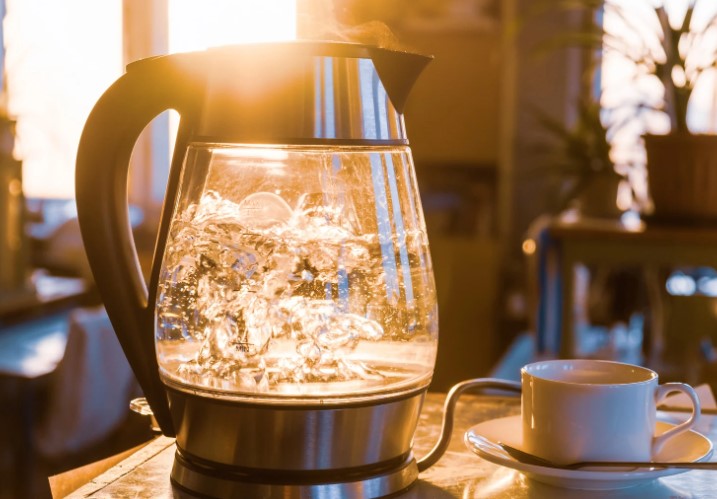
How Many Watts Does a Kettle Use in the UK?
Typical wattage ranges for UK kettles
The vast majority of electric kettles in the UK fall between 2,000 and 3,000 watts. Here’s what I commonly see in shops:
| Type of Kettle | Typical Wattage |
| Basic electric kettle | 2,000 – 2,400 W |
| Fast-boil kettle | 2,800 – 3,000 W |
| Compact/travel kettle | 600 – 1,000 W |
| Smart kettles | 2,200 – 3,000 W |
How different brands compare?
While most kettles aim for that 3kW sweet spot, some brands offer energy-saving models that operate at slightly lower wattage but with improved insulation or boil-detection tech to conserve power.
Are energy-efficient kettles worth it?
Absolutely.
Though they might cost a little more upfront, kettles with energy-efficient features (like variable temperature control or insulated walls) can reduce your kettle energy consumption over time—especially if you’re a frequent tea drinker like me.
How Many Watts Is a Kettle?
What’s the standard wattage for home kettles?
If you’re wondering how many watts is a kettle, the answer is usually between 2,200W and 3,000W.
That’s standard for UK households, especially where speed and convenience are priorities.
High-wattage vs low-wattage kettles: what suits me?
If I need my cuppa fast and often, I’d go with a 3kW fast-boil model.
If I’m off-grid or want to conserve energy for eco-living, I might choose something closer to 2,200W or lower.
Wattage Comparison of Popular UK Kettles
| Brand & Model | Wattage | Notable Feature |
| Russell Hobbs Inspire | 3,000 W | Fast-boil, energy-efficient |
| Breville Impressions | 3,000 W | Stylish with rapid boil |
| Swan Travel Kettle | 920 W | Compact, ideal for caravans |
| Dualit Classic | 2,400 W | Durable build, traditional look |
How Much Electricity Does a Kettle Use Per Boil?
Let’s break it down
If I boil 1 litre of water using a 3,000W kettle for 3 minutes:
- 3,000W ÷ 1,000 = 3kWh (per hour)
- (3 ÷ 60) hours = 0.05 hours
- 3kWh × 0.05 = 0.15kWh per boil
The average rate of £0.27 per kWh at the UK, that’s:
- 0.15 × £0.27 = £0.0405 or roughly 4p per boil
Using energy calculators to estimate
There are more UK-based electricity cost calculators available online.
I often use them to quickly estimate how much energy my kettle (and other appliances) are costing me over time.
Boiling Cost Table
| Water Amount | Boil Time (3kW kettle) | Estimated Cost |
| 250ml (1 cup) | 1 minute | £0.013 |
| 500ml (2 cups) | 1.5 minutes | £0.020 |
| 1 litre | 3 minutes | £0.040 |
| 1.5 litres | 4.5 minutes | £0.060 |
What Affects a Kettle’s Power Usage?
Water volume
It’s simple: the more water I boil, the more energy I use. So this is why I only fill the kettle with exactly what I need.
Initial water temperature
Water straight from the tap is colder in winter.
That means the kettle works harder to bring it to a boil, using more energy than it would in summer.
Bad habits to avoid
- Re-boiling water multiple times
- Overfilling the kettle “just in case”
- Ignoring limescale buildup, which lowers heating efficiency
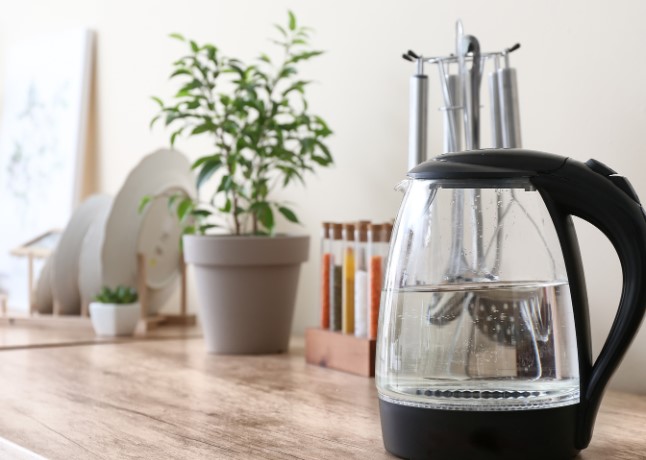
Can I Reduce My Kettle’s Energy Consumption?
Absolutely. Here’s how I do it:
- I measure the exact amount of water I need
- I descale my kettle monthly to maintain performance
- I avoid repeatedly re-boiling the same water
What to look for in an energy-efficient kettle?
When I was shopping for a new kettle, I looked for:
- Auto shut-off functions
- Boil-detection sensors
- Thermal insulation
- Variable temperature settings
Top 5 Energy-Saving Kettle Tips
- Boil only what you’ll use
- Choose a kettle with auto shut-off
- Keep your kettle free from limescale
- Opt for a lower-wattage model for occasional use
- Use warm (not hot) tap water when safe
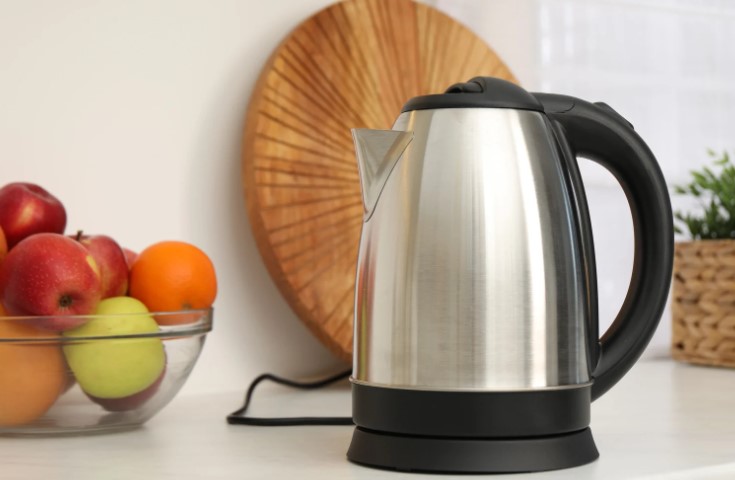
Conclusion: A Little Appliance That Packs a Punch
Now that I know how many watts a kettle uses, I’m much more mindful when I make a brew. It’s usually around 2,000 to 3,000 watts, but the real savings come from how I use it.
By boiling less water, choosing an efficient model, and avoiding bad habits, I’ve trimmed my electricity usage without giving up my tea time ritual.
Frequently Asked Questions
1. Is a kettle more efficient than a stove?
Yes—especially electric kettles in the UK, which transfer heat more directly than a hob or microwave.
2. Does higher wattage mean better performance?
Not always. While it boils faster, a higher-wattage kettle might not be ideal if you’re trying to be energy-efficient.
I’d say it’s about balancing speed and sustainability.
3. What wattage is ideal for UK homes?
In my experience, a 3,000W kettle is perfect for most UK households.
It strikes the right balance between fast boiling and practicality.

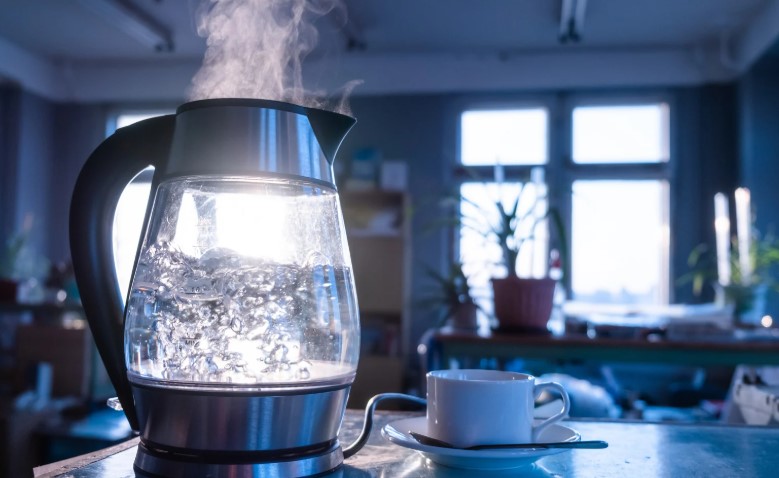
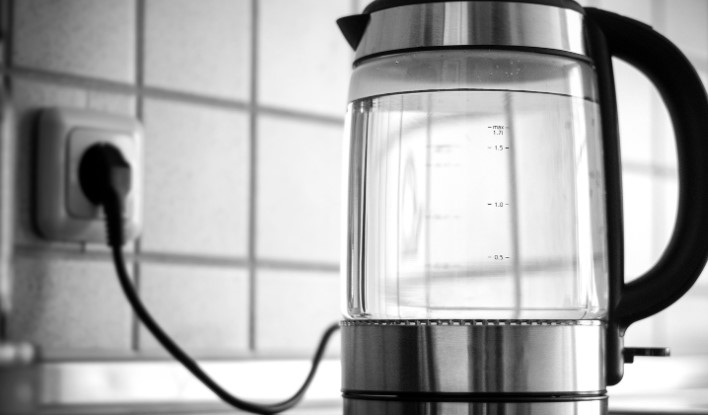
0 Comments